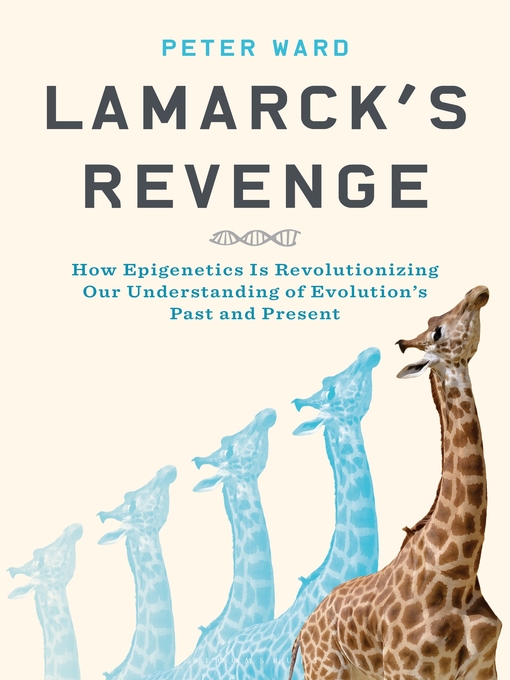Lamarck's Revenge
How Epigenetics Is Revolutionizing Our Understanding of Evolution's Past and Present
In the 1700s, Jean-Baptiste Lamarck first described epigenetics to explain the inheritance of acquired characteristics; however, his theory was supplanted in the 1800s by Darwin's theory of evolution by natural selection through heritable genetic mutations. But natural selection could not adequately explain how rapidly species re-diversified and repopulated after mass extinctions. Now advances in the study of DNA and RNA have resurrected epigenetics, which can create radical physical and physiological changes in subsequent generations by the simple addition of a single small molecule, thus passing along a propensity for molecules to attach in the same places in the next generation.
Epigenetics is a complex process, but paleontologist and astrobiologist Peter Ward breaks it down for general readers, using the epigenetic paradigm to reexamine how the history of our species-from deep time to the outbreak of the Black Plague and into the present-has left its mark on our physiology, behavior, and intelligence. Most alarming are chapters about epigenetic changes we are undergoing now triggered by toxins, environmental pollutants, famine, poor nutrition, and overexposure to violence.
Lamarck's Revenge is an eye-opening and provocative exploration of how traits are inherited, and how outside influences drive what we pass along to our progeny.
-
Creators
-
Publisher
-
Release date
August 14, 2018 -
Formats
-
Kindle Book
-
OverDrive Read
- ISBN: 9781632866172
- File size: 4179 KB
-
EPUB ebook
- ISBN: 9781632866172
- File size: 4179 KB
-
-
Languages
- English
-
Reviews
-
Publisher's Weekly
June 11, 2018
The main question posed by this frustrating book is whether the acquired characteristics of one generation can be reliably passed on to future generations. In other words, was 18th-century naturalist Jean-Baptiste Lamarck in fact correct that parents can pass on physical changes they’ve undergone over their lifetime—for instance, improved musculature—to their children, despite this theory having long been considered disproven by Darwin? Ward (Gorgon), a paleontologist and astrobiologist, defines epigenetics as “the study of heritable gene functions that are passed on from one reproducing cell to another, a somatic (body) cell or a germ cell (sperm or ovum), which do not involve a change to the original DNA sequence,” while also cautioning that the actual process is “still poorly understood.” Ward’s analysis ranges widely, taking in the origin of life on Earth, patterns of recovery from mass extinctions, the possible genetic basis for violence, and the genetic impact of various pandemics. Ward references the classic study showing how starvation impacted one and perhaps two generations in the Netherlands following a WWII-era famine, but provides little hard evidence beyond that example. Without a proposed mechanism for such long-lasting effects and without data indicating such effects exist, Ward leaves readers with little more than suppositions. -
Kirkus
Starred review from June 15, 2018
A fascinating journey into the relatively new field of epigenetics, which "has a great deal to add to the overall understanding of the history of life, beginning with the origin of the first living species itself."According to this outstanding account by paleontologist and astrobiologist Ward (The Flooded Earth: Our Future in a World Without Ice Caps, 2010, etc.), epigenetics is the biological revolution du jour. The author explains that Jean-Baptiste Lamarck (1744-1829), a predecessor of Charles Darwin, believed that species evolved by passing on acquired characteristics. The oft-repeated example was a giraffe stretching to reach leaves in tall trees and giving birth to offspring with longer necks. However, Lamarck was marginalized by Darwin's teaching that acquired traits are never inherited but that children vary slightly from their parents. When a variation provides a survival advantage, its possessor produces more offspring, and this "natural selection" slowly drives evolutionary change. Yet fossil evidence doesn't support it. "New species," writes Ward, "appear with what seems like too much rapidity to be explained by current theory." Bacteria routinely pass genes to neighbors, including unrelated species. Does "horizontal gene transfer" occur in complex organisms? The answer came when studies showed stretches of bacterial and viral DNA in the human genome. Biologists also knew that stressful environmental conditions change gene function. They mistakenly assumed that these changes vanish when the organism produces sex cells for reproduction. It turns out that "major environmental changes during the life of an individual can cause heritable changes to that organism, that can then be passed on to the next generation." This defines epigenetics: a better explanation for life's history and the quick appearance of unique body plans after mass extinctions. Skilled in both science and writing, Ward walks readers through its history, mechanisms, and the current fierce debate over its role.The best introduction so far to one of the most controversial elements of 21st-century evolutionary science.COPYRIGHT(2018) Kirkus Reviews, ALL RIGHTS RESERVED.
-
Loading
Why is availability limited?
×Availability can change throughout the month based on the library's budget. You can still place a hold on the title, and your hold will be automatically filled as soon as the title is available again.
The Kindle Book format for this title is not supported on:
×Read-along ebook
×The OverDrive Read format of this ebook has professional narration that plays while you read in your browser. Learn more here.


